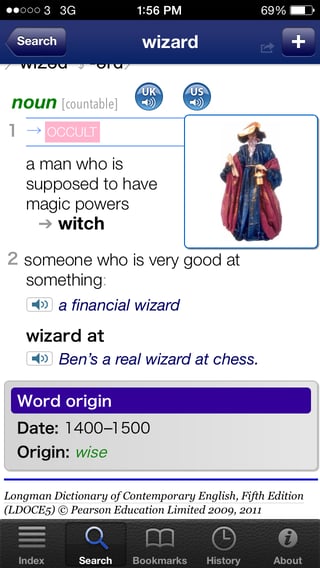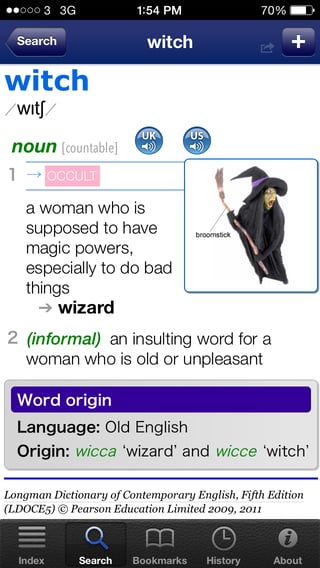The word witch has never been exclusively female in use.
Indeed, the second picture you include in your question does after all give both male and female forms of the Old English form of the word; wicca and wicce, though it translates the former as wizard in keeping with its oversimplification. At the time, these were the male and female forms of the same noun, as English was then a more strongly gendered language, comparable to how the loan words fiancé and fiancée are male and female respectively.
(In contemporary use Wicca/Wica refers to a subset of modern practices of witchcraft starting in the mid-20th century as a collective noun ["the Wica" in Gerald Gardner, Witchcraft Today, 1954] and later as a name for their practice as a whole; hence a Wiccan is one who practices Wicca being either the form of witchcraft Gardner described, a descendant of it, or a form influenced by it in some way though the differences between them are something I could write a book about. Indeed I did write a book about it. This modern use pronounces the word according to Modern English spelling rules, /ˈwɪkə/ rather than /wɪtʃə/ as the Old English word was pronounced, the spelling changing when Normans introduced the use of CH for ʃ sounds).
The fact that there were once separate male and female forms of the word may have had some influence upon the word going through periods of being associated more with women than with men, and indeed the OED has two separate entries for witch, one specifically male (and derived from wicca) the other specifically female (and derived from wicce), though this seems rather pedantic given that the difference between the two hasn't been discernible in either speech or writing since the 11th century.
There have also been claims at various times that associated women more strongly with witchcraft, most famously those in the Malleus Maleficarum. While the influence of the Malleus upon accusations of witchcraft are arguably overstated, and while there have been times and places where accusations made against men outnumbered those against women (in the far north of Europe, particularly), it does remain that witchcraft became particularly associated with women culturally both when considered negatively, but also when considered positively.
The etymology of wicca/wicce is unclear, and likely comes from a word that simply means "one who does magic" though other suggestions have been made and its worth noting that until recently "wise one" was understood to be the etymology.
It's worth noting that, because wizard almost certainly does come from wise with the -ard suffix which was once used to turn adjectives into nouns (bastard, coward and many other words come from the same process).
So, wizard was a word that more clearly means wise one, and did not necessarily refer to any magical ability at all, but could include a philosophically inclined or mentally gifted person, and indeed was used in such a sense first, hence:
The Grecians..haue therin taken great paynes, naming it first Sophia, and suche as therin were skilled Sophistes or wysardes.
Or to translate some of that into more contemporary English:
The Greeks… had taken great pains, naming it first Sophia [Wisdom], and may of them where skilled Sophists or wizards.
Because witch came to be associated more with women than men, and because wise was understood as being behind the etymology of that name (even if probably incorrectly), wizard came to be used as a male form by some.
Because warlock was also available as a word for male witches, and one more clearly seen as always negative, this led to wizard being more often used where the nuance would be positive, though by no means exclusively so, and some men who were charged with witchcraft or suffered mob-violence on such grounds were referred to as wizards in the records we have of them.
As such, the two words have an overlap between them, but are not so synonymous as to be correctly thought the male and female equivalents of each other. The male equivalent of witch is witch, (or sometimes warlock though a great many witches object to being called this* as a wholly negative term that originally meant "oath-breaker") and the female equivalent of wizard is wizardess (or merely wizard under the general tendency from the late-20th century on to do away with female forms of many words as needlessly sexist).
*To this day the majority of male witches reject the term warlock, though personally I don't get upset being called a warlock as the origins of both it and witch are not as straightforward as those witches refusing it entirely would suggest.


